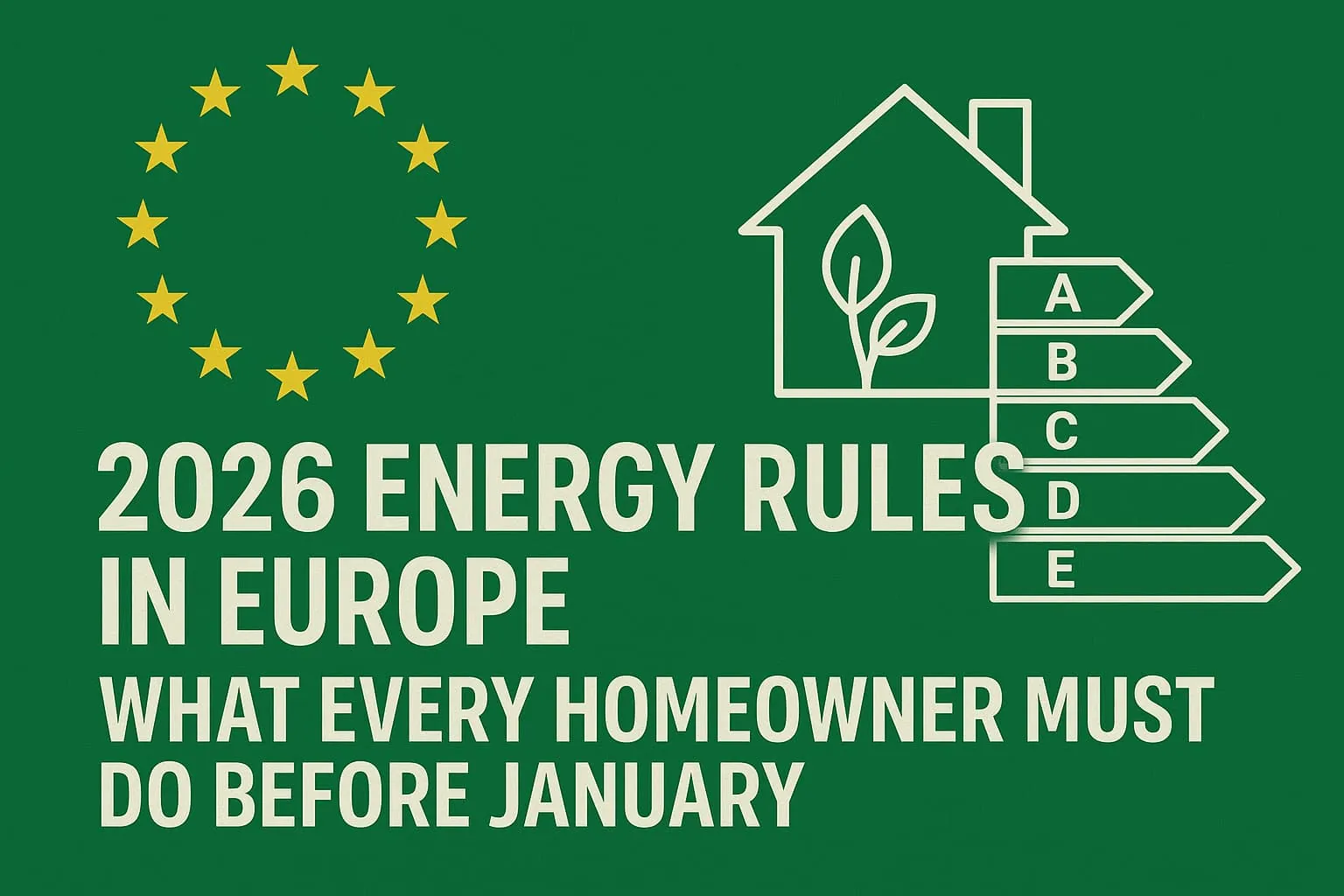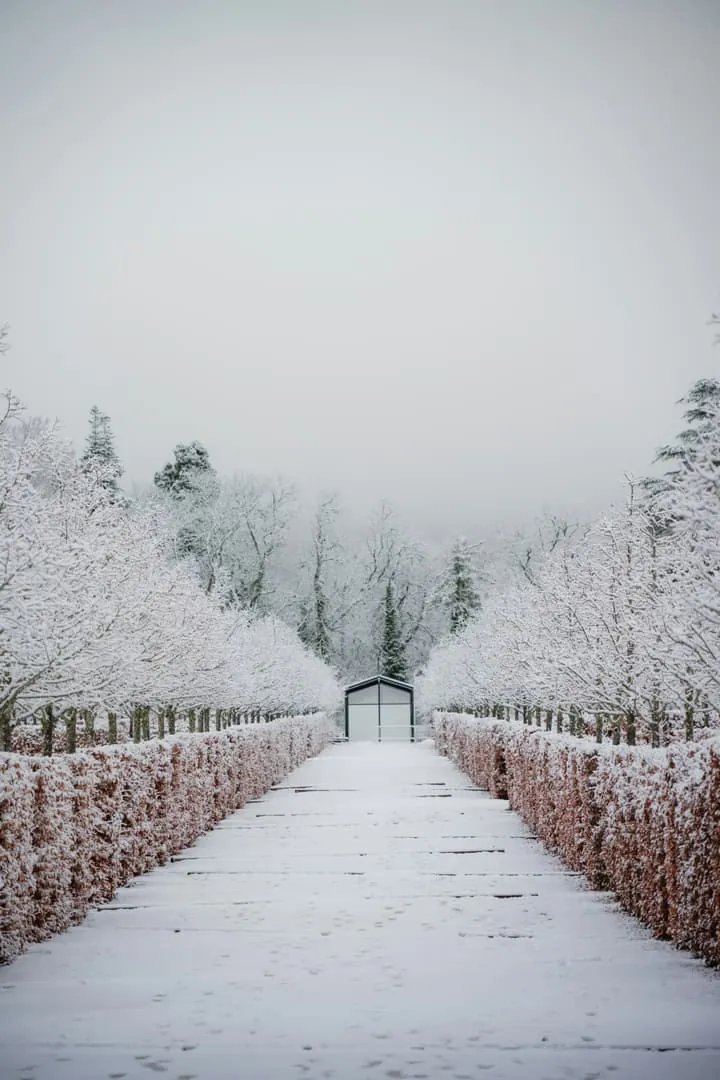
2026 Energy Rules in Europe: What Every Homeowner Must Do Before January
Starting January 1st, 2026, Europe enters a new phase of its energy transition strategy. Insulation rules, heating upgrades, energy-performance thresholds and subsidy changes will reshape how millions of homes operate. For homeowners, this is no longer optional — several actions are becoming mandatory, others strongly incentivised. Here is the full guide to be ready on time.
1. Why are these new rules coming in 2026?
The EU wants to reduce emissions by 55% by 2030, and buildings are responsible for around 36% of them. The 2026 energy package introduces higher requirements to push renovation and cut gas dependency.
Main objectives:
- reduce gas dependency
- accelerate heat pump adoption
- renovate 35 million homes by 2030
- lower household bills
These measures follow the 2022–2023 energy shock and gas price spike.
2. Major obligations starting January
From January 2026, several obligations will progressively apply in most EU countries (details vary by state, always check your national portal).
Obligation 1 — Phase-out of gas boilers:
- no new gas boilers in many new-build projects
- subsidies removed in several countries for standalone gas boilers
- transition encouraged towards heat pumps, hybrid systems and district heating
Obligation 2 — Stronger energy audits:
- selling a property will increasingly require a complete energy audit, not just a simple EPC
- renovation recommendations will be attached to the report
Obligation 3 — Minimum energy thresholds:
- homes rated F or G on national energy labels will be under pressure to plan renovations
- in some countries, the worst-performing rentals will face progressive letting restrictions
For details, consult your national energy agency (for example ADEME in France or Germany's BAFA).
3. Insulation: the core of 2026 rules
Before any heating upgrade, governments insist on tackling heat loss first. Priority actions:
- loft insulation
- wall insulation
- replacing single-glazed or very old windows
These measures alone can reduce heating bills by 15–40%. They also improve comfort immediately and make future heat pump installations smaller and cheaper.
On GreenDailyFix, you can dive deeper into insulation strategies in our guides on eco insulation and natural materials and autumn home energy checks.
4. Financial help in 2026
Each country keeps its own subsidy rules, but 2026 brings clear trends:
- higher heat pump subsidies for low-income households
- bonuses when insulation and heating are combined in the same project
- extra support for low-carbon or renewable heating (geothermal, solar thermal, biomass in some areas)
In France for example, national grants and green home loans are key tools (see our guide on green home loans France 2025).
Always check your national one-stop-shop platform or energy agency website before starting work; many countries have official renovation portals similar to France Renov.
5. Heat pumps: what changes in 2026
Heat pumps sit at the heart of 2026 energy rules. New standards include:
- higher minimum energy performance
- stricter outdoor noise limits
- bonus subsidies for low-consumption models
- obligations to prioritise heat pumps or renewable systems in many public buildings
If you want to understand national incentives in detail, see our guide on heat pump subsidies in France 2025 and our overview of future low-carbon homes.
6. How to prepare before January
You do not need to renovate everything at once. A clear roadmap already puts you ahead of 2026 rules.
Step 1 — Perform an energy pre-diagnosis:
- use your national online simulator or contact a certified auditor
- collect past energy bills to understand your baseline
Step 2 — Prioritise insulation:
- start with the least disruptive works (loft, basement ceiling)
- then tackle walls and windows during planned refurbishments
Step 3 — Choose your future heating system:
- air-to-water or air-to-air heat pump
- hybrid boiler + heat pump
- district heating connection where available
Step 4 — Prepare subsidy files:
- check application deadlines: some 2026 schemes will be revised in spring
- in France, many households combine energy grants with support from CAF and local authorities; other countries offer similar social top-ups.
For more ideas, read our articles on saving on winter heating and reducing electricity bills in winter.
Frequently Asked Questions
Do I have to replace my gas boiler in 2026?
Not automatically. The new rules mainly restrict new gas boiler installations and shift subsidies towards low-carbon systems like heat pumps. However, very old and inefficient boilers will become less attractive as incentives disappear and efficiency standards tighten.
What should I renovate first to comply with 2026 rules?
Start with insulation: lofts, walls and windows. Reducing heat loss makes every future heating system smaller, cheaper and more efficient, and it usually delivers the fastest savings on your bills.
Which households benefit most from financial support?
Low-income and vulnerable households often receive the highest grant rates for insulation and heat pumps. Many schemes use income brackets and energy performance criteria, so it is worth running a simulation on your national renovation portal.
Conclusion: Preparing early for the 2026 energy rules is not a burden — it is an opportunity to save money, boost comfort and maximise home value while cutting emissions.
About the author:
Alexandre Dubois is a French sustainability enthusiast sharing practical tips for greener living. With years of experience in energy efficiency consulting, he helps households reduce their environmental impact without sacrificing comfort. Contact: info@greendailyfix.com
Related posts

The Winter Home Problem Nobody Talks About: Humidity, Mould, and the Air You’re Breathing
Every winter, we seal our homes to keep warmth in — and trap something else inside. Humidity rises, air stagnates, and invisible pollutants accumulate. In 2026, indoor air quality is becoming one of the most overlooked health issues in European homes.

From Optimisation to Protection: Why European Homes Are Redefining Energy Strategy in 2026
For years, energy advice focused on optimisation: better efficiency, higher performance, maximum savings. In 2026, European households are quietly changing priorities. The new goal is not perfection - it is protection.

The Illusion of Energy Stability: Why Europe's 2026 Calm Is Costing Households More Than They Think
For the first time in years, Europe entered winter without an energy shock. No dramatic price surge. No emergency headlines. And yet, something more dangerous is happening quietly: households are mistaking stability for safety.

Europe’s Winter Wake-Up Call: The Hidden Energy Decisions Millions of Homes Will Regret Delaying in 2026
This winter, Europe didn’t freeze — but something else happened quietly. Millions of households realized that energy problems no longer arrive as shocks. They arrive as slow, expensive regrets. Winter 2026 isn’t about panic. It’s about the cost of waiting.